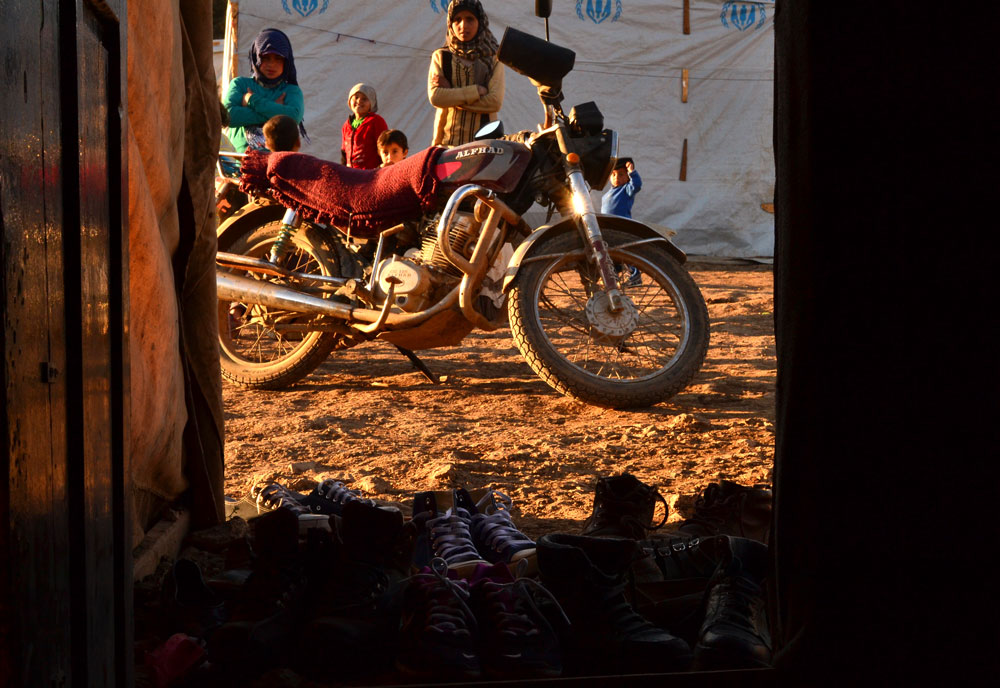Four years of a raging civil war in Syria have displaced more than eleven million people, ushering in the largest exodus since World War II. Of those forced from their homes, four million have fled the country. While the crisis has now reached Europe in a very visible way, the majority of Syrian refugees are not (yet) risking the hazardous journey to its shores. Instead, they are staying in countries not far from Syria’s borders: Turkey, Jordan, Iraq, Egypt, and—most noticeably—Lebanon, where an estimated one in three people is now Syrian.
Anahid, an ethnic Armenian woman from Aleppo, escaped Syria in 2012, soon after the country was engulfed in fighting between President Bashar al-Assad’s authoritarian regime and various rebel factions. She fled to Yerevan, the capital of her ancestral homeland, which borders Turkey. Later, Anahid moved to Lebanon, where she has relatives. There, she worked with Syrian refugees in their overcrowded camps. Last year, she traveled back to Syria with her British husband, Joseph Bailey, and witnessed the country’s presidential election. (Anahid is an alias. She has asked that her real name not be used because her father is still in Syria.)
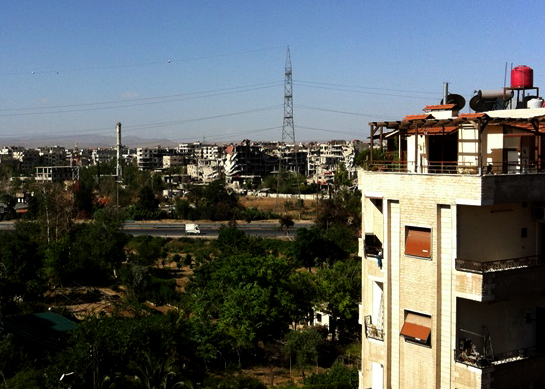
A vivacious woman in her late twenties, Anahid studied tourism in Aleppo but currently works as a freelance translator. When the war broke out, she and other Syrian Armenians were able to find refuge in Armenia because the government recognized them as citizens. Nevertheless, some of the Armenians already there did not welcome them at first, Anahid says. Culturally, the two groups are distinct. The modern Republic of Armenia, a Soviet state for eighty years, has developed a Russian-influenced dialect that is very different from the Armenian spoken in Syria. Most of those who are now “repatriating” to Armenia are descended from the Armenians who were relocated during the 1915 Armenian genocide, which took place in what is now modern Turkey and involved the killing, forced migration, and starvation of an estimated 1.5 million men, women, and children. (Anahid’s grandfather was one of the survivors: a young boy when he left Anatolia on his own, he was adopted by a Kurdish family in Aleppo and never learned what happened to his family back home.)
Aleppo until recently had an ethnic Armenian population of 60,000—one of the largest in the Middle East. Today, the city’s Armenian district is a fraction of its former size, with only a handful of hangers-on. Located inside a government-controlled area, it continues to be bombed by rebel forces.
Unlike Anahid, many ethnic Armenians and other Christian minorities in Syria supported the country’s secular socialist regime even before the conflict, believing that Assad offered them a degree of protection against Islamic extremism. Recently, Russia joined the conflict on the side of the government, providing air cover for a massive, ongoing push to retake rebel-held areas of Aleppo. While its actions have rankled Washington, Russia’s support of the Assad regime is seen more positively by some Syrian Armenians, who fear that the Islamic State, and not the US-backed rebels, will control the country once Assad falls. If that happens, there may not be a home for them to return to.
In The Fray contributing writer Jo Magpie interviewed Anahid about the events that drove her to leave Aleppo, her life as a “repatriate” in Armenia, and the refugee camps that she worked in while living in Lebanon—whose desperate conditions are pushing some Syrians to brave a perilous overseas journey to Europe.
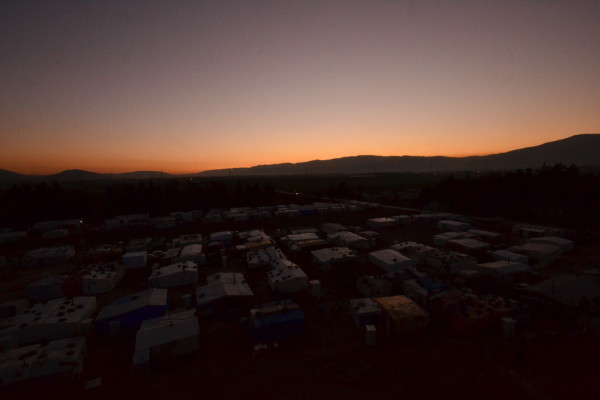
When did you leave your home in Aleppo, and how easy was it to get out?
I left in 2012, in the last week of June. It wasn’t as bad as now, it was just the beginning of the problems in Aleppo. There had already been three big explosions before I left. The first one was on a Sunday. Me and my friend went to have breakfast near our house, and the minute we got out, there was this huge explosion. We didn’t know it was an explosion, so we started looking around. Then we saw that the building right in front of us was full of dust, and the glass was falling. People were running, and ambulances started to come.
A week later we were like, “Okay, everything looks safe, the city is calm, let’s go and have breakfast in front of the Citadel.” After fifteen minutes, while we were waiting for food, a protest started nearby in the Umayyad Mosque, and they [the government forces] started shooting at them. [The mosque’s famed minaret was destroyed in fighting in 2013. —ed.] We just had to run. My friend had to carry me because I was too scared to move. We just took the first bus that was getting out of there.
We didn’t plan to leave Aleppo. We were going to go back, but we heard that it was getting worse there.
How was your reception in Armenia? Was it easy to settle in?
It was more difficult for Syrians to be accepted here at that time. When I got a university scholarship, a group of kids would come to me at breaks and say, “You shouldn’t be studying here. Our parents save up money for years so that we can come to university, and you guys came like a month ago, and now you can come here for free.”
If you knew a local, people would accept you more. But if you were on your own, it was very hard. First the language barrier, and second that they were not feeling comfortable that people from another country were coming, and they thought their government was helping the Syrians—which was not true.
What’s your impression of how Yerevan has changed due to Syrian Armenians coming?
It’s helped the economy here a lot. They opened businesses that the locals weren’t able to, which means hiring more people. So the change is not bad, it’s mostly good—leaving aside the racism. A really small number of locals still consider us Arabs, or consider us to have betrayed the country—[we] left while the genocide happened and never came back. “You’re only here now that your country is in a war,” and stuff like that. But most people are very warm here now. They aren’t like they used to be three years ago.
You spent some time visiting refugee camps in Lebanon. What happened?
We moved from Armenia to Lebanon because my mum’s parents are there, and we thought we would have an easier life. It’s closer to Syria, a lot more aid organizations and the UN are there. I worked for a nongovernmental organization for three weeks as a volunteer. We would go to the camps and talk with women, to see how they were coping with life. When I stopped volunteering with the NGO, I decided that I wanted to go and visit with my friends sometimes. We would take candies or toys for the kids.
From the day we left Syria, me and a group of friends would always collect clothes and ship them to Syrian refugee camps in Turkey, Lebanon, or Jordan. Some Syrian musician friends did a benefit concert, and they made $5,000. It was very cold in the camps, so the title was “A Bag of Wood.” The donations and the ticket money made enough for 300 families—for wood to burn in the winter—and we bought some extra stuff, like rain boots for the kids. Me and Joseph decided to do some crowdfunding to make more money for blankets, and collected almost the same amount.
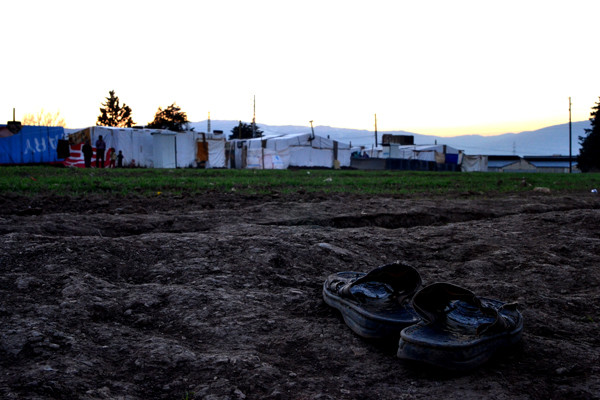
What was the situation like in the camps you visited?
Back then I would always get shocked, but now it’s normal for me. The tents are basically a few pieces of wood. Sticks. And then big plastic sheets that the UN gives to them. Some use paper sheets from the billboards. They basically steal them, so they can cover more, because the UN only gives them six or eight sticks and three or four pieces of plastic, which is not enough to make a tent big enough for a family. There was this one woman who has nine kids, without her husband, because he was killed. Then she has her mum, dad, brothers, sisters, their families—they live in one tent.
Some of [the refugees] have heaters inside. Some of them have water, some don’t. In every camp there is one person who has a car, and most of the time this person becomes the leader of the camp. He goes to get water, and they bring barrels and fill them. The water containers that the UN gives to them are very small. It’s not enough for a family.
[The UN] would give them $30 a month for bread. Then they made it $28. They give you some flour, some rice. They would tell them that their kids can go to schools, but the schools are very far away. Nobody can drive them, and they cannot afford to take them, so they stay there.
They don’t have bathrooms. Each camp has one or two bathroom spaces outside somewhere, where they have made tents with these plastic things. This one camp had 100 or 150 families, and I didn’t see more than six or seven bathrooms.
There are unrecognized [private] camps. The owners often make demands, like “I want rent for the floor that you’re putting in your tent.” You can register for a UN-recognized camp, but some of [the refugees] are scared to go there. Some of them want to be closer to the city or to places where they can have a chance to work in a factory—but for a quarter of the wages a local would get.
It’s hard in Lebanon. Syrians are not very accepted there. The last few months I was there it was even more difficult for Syrians to find a job. Even if you can afford to rent a flat, you can’t afford to go to school.
Do you think that’s because of the amount of people that are coming now?
That has a very big influence. A lot of people say, “When there was war in Lebanon, Lebanese people also came to Syria.” But Lebanon is like four million [people]. [Including refugees, Lebanon’s population is now estimated to be six million. —ed.] If half of them came to Syria, Syria is big and it’s not so noticeable. But now half of Syria came to Lebanon. Lebanon is like a quarter of Syria’s size. They don’t have space. Cities were already overcrowded. It was already difficult for Lebanese people to have a job. Now Syrians are also looking for jobs, so that makes them a bit defensive.
How is the situation out of the camps—like, in Beirut, the capital?
In the city center you see a lot of Syrians who regret leaving [the camps]. They leave with the hope of moving to the city to find jobs and have a better life, but they end up homeless there, and nobody helps them.
Most of them are kids. At the end of the day, when they finish what they’re doing on the street—begging, selling flowers, or whatever—they go and sleep in the buildings. I would see one of them every day. He would sleep in a cardboard box with his little brother. They’re not older than twelve years old. During the day they sell flowers, and they sleep in the same spot.
We would ask [the homeless] where they’re from in Syria, to make sure they’re Syrians, and we would give them some money. Some of them were so excited that they didn’t believe it. We were in the car because we didn’t want a pile of people climbing on us when we were giving money. One of them took the money and ran away, then started running back, saying “You gave me too much!” He expected us to take it back.
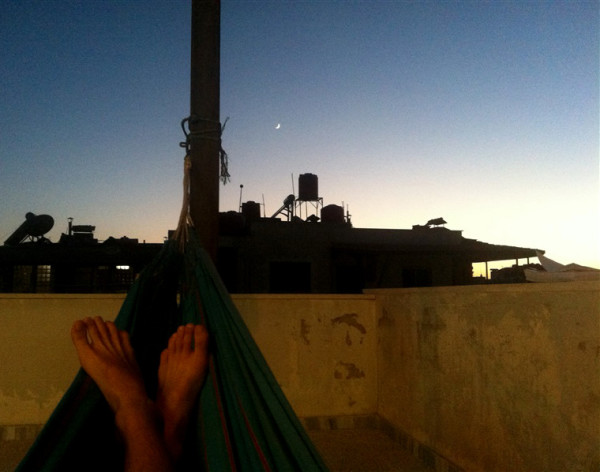
You went back to back to Syria recently. How was that?
I didn’t go to Aleppo. It wasn’t safe, especially when I have my husband, a foreigner, in Syria.
We stayed in Damascus for a few weeks, and it was normal, but right in front of [the house] was the ruined neighborhood. And then you have the Highway of Death. It’s the highway of the airport, but they call it the Highway of Death because one side is the rebel-held area and the other side is the government’s, so they keep shooting each other, especially when there are military buses or cars passing through.
We got there on the day of the Syrian election results. [Assad was reelected by a wide margin in 2014, but the opposition and many Western leaders called the election a sham. —ed.] There were celebrations, because we were in a government-controlled area, but you could see rockets flying to the other side.
I was used to it. I thought it would be scary for Joseph, but he kept insisting to sleep on the balcony on the top floor. We would watch the rockets every night.
This interview has been condensed and edited.
Jo Magpie Jo Magpie is a freelance journalist, travel writer, and long-term wanderer currently based in Granada, Spain. Blog: agirlandherthumb.wordpress.com
- Follow us on Twitter: @inthefray
- Comment on stories or like us on Facebook
- Subscribe to our free email newsletter
- Send us your writing, photography, or artwork
- Republish our Creative Commons-licensed content

